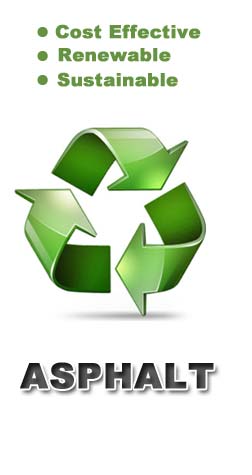
![]() At Wilk we strive to make our everyday practices address:
At Wilk we strive to make our everyday practices address:
- climate change,
- improve air quality
- improve water quality
- provide green jobs, and
- reduce the carbon footprint of installed asphalt pavements.
By continually improving materials, designs, and best practices, we hope to provide a product that extends asphalt pavement life and reduces cost to both the environment and to our customers.
Sustainability
At Wilk Paving Inc, we believe in and support the sustainability
of Vermont’s way of life and the preservation of our natural resources.
We make every effort to ensure that our work, while providing good
roads
and driveways for commerce and convenience, has the smallest
possible impact on our environment.
Asphalt is The Environmental Pavement of Choice
Asphalt is the sustainable material for pavements in parking lots,
roads, and driveways. Asphalt pavements minimize impact on the
environment through:
- low consumption of energy for production and construction
- low emission of greenhouse gases, and
- conservation of natural resources.
Emissions from asphalt plants, including greenhouse gases, are very low and well-controlled. Emissions from asphalt plants are so low, that the EPA considers them as only minor sources of industrial pollution. Wilk Paving, Inc. exclusively burns ultra-low sulfur fuel to ensure we have the lowest emissions possible.
Asphalt — The Most Environmentally Advanced Building Material in The World
The asphalt industry as a whole, reclaims about 100 million tons of its own product every year, and reuses or recycles about 95 million tons, making the Asphalt Paving Industry America’s number one recycler. WILK paving accepts milled or chunked asphalt at no charge. We process it and put a portion of it back in driveways, parking lots or roads.
Other materials are routinely recycled into asphalt pavements saving precious landfill space. These materials make roads last longer, provide skid resistance and maximize driving safety. These recycled materials include:
- rubber from used tires
- glass
- blast furnace slag, and
- asphalt roofing shingles.
Sustainable Asphalt Road Construction
When appropriately designed, constructed and maintained, roads do not wear out. Total removal and reconstruction of roads is not needed. Maintenance is simple and easy: only the top layer of asphalt is removed and replaced. This is called cold-planing. Cold planing can be done quickly—even overnight— and it saves money. The material that has been reclaimed is then recycled. The newly overlaid road surface (which contains recycled asphalt material) is good-as-new pavement.
Once constructed, asphalt pavements have minimal impact on the environment. When used for parking lots, roads, walking/biking paths, and other applications, porous pavements with underlying stone recharge beds can turn runoff into infiltration and restore the hydrology of a site or even improve it. Porous pavements conserve water, replenish aquifers, and protect streams.
At Wilk we strive to make our everyday practices address climate change, improve air quality and water quality, provide green jobs, and reduce the carbon footprint of installed asphalt pavements. By continually improving materials, designs, and best practices, we hope to provide a product that extends asphalt pavement life and reduces cost to both the environment and to our customers.
To learn more about sustainability and the Asphalt Paving Industry, visit the National Asphalt Paving Association at www.hotmix.org